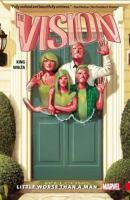
The pursuit of a set purpose by logical means is the way of tyranny; this is the vision of my creator. Of Ultron.
The pursuit of an unobtainable purpose by absurd means is the way of freedom; this is my vision of the future. Of our future.
Whoa. Wow.
On its face, Little Worse Than a Man appears to be a superhero comic. It's certainly a story about a superhero. But it's about a superhero trying not to be super, trying to live a normal life. More significantly, it's a story about an artificial intelligence trying to live a human life. Trying to be human. Trying to become human by living like one. And failing utterly.
Not at first. The Vision's enterprise starts off well enough. He is an artificial intelligence (and body) made from organic matter--made to live and learn and grow--and he makes himself a wife and twin children in his own mold. Together, they get a house in the suburbs and try to become a family like any other.
But even from the beginning there are cracks. This book is full of wonderfully ominous foreboding. Darkness looms. On the very first pages, for instance, at the end of the opening scene when the family is welcomed to the neighborhood by a nearby couple, the narrator shares:
So they all said their goodbyes and promised to meet again. Maybe they'd get brunch at that new organic place next to the Italian place.
Later, near the end of our story, one of the Visions will set George and Nora's house on fire.
They will die in the flames.
A bit further into the book, yet still in its first half, one of the teens gets in trouble at school. The parents meet with the principal. At the end of that scene, the narrator offers:
Principal Sam Waxman of Alexander Hamilton High School will remember this moment for the rest of his life. He will wonder what would have happened if he had been firmer with the Visions that day, if he had not retreated from his initial position. Would that have made a difference? If he had acted right then, right at the beginning, maybe he too could have saved the world.
And, nearer the end of this volume, after there has been suburban-scale deception, family conflict, unintentional injury--and death--and a chain of events that threatens to spin out of control:
Thirty-seven times. He saved us all.
Thirty-seven times.
And all of it cannot redeem him from this, this small moment when he crossed to the other side, when he entered into the madness that was soon to come.
This small moment.
This small lie.
Because the darkness foreshadowed throughout is not realized in this story. This is the story of a small failure, an attempt at normalcy that fails utterly with dire consequences--but they are relatively normal, human consequences. At the end it is revealed this story is merely a prelude to what will follow, a disaster of truly epic proportions. Perhaps, even, the end of everything. All because a not-man wants to be a man.
And though this is a small story about a family trying to live small lives, the telling is super. Far better than most superhero comics I've read. Despite the Vision's failure to become human, this is a tale of humanity.
A few more quotes (lacking context):
Facts without context are like individuals without society. Just as an individual must find his or her place in society or else they are useless, a fact must find its place in an argument or else it serves no true purpose.
You cannot hate what you do not know. They do not know you, therefore they are incapable of hating you. Perhaps I might concede they hate the idea of you. But if this is true, then your task is a simple one. You merely have to show them that you are not that idea.
To assert as truth that which has no meaning is the core mission of humanity.
